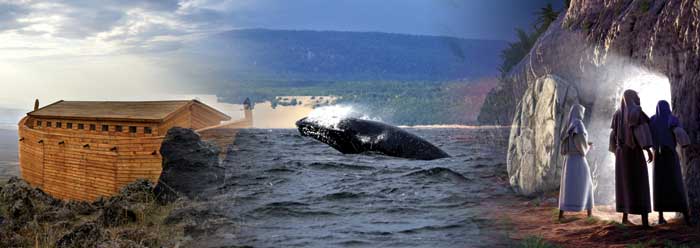And the ark rested in the seventh month, on the seventeenth day of the month, upon the mountains of Ararat (Genesis 8:4).
And the LORD spake unto the fish, and it vomited out Jonah upon the dry land (Jonah 2:10).
He is not here: for he is risen, as he said. Come, see the place where the Lord lay (Matthew 28:6).
These three verses of Scripture speak of three great events of history, widely separated from each other in time, but each involving a mighty miracle. Each testifies of God’s creative power, as well as His judgment on sin and His grace in salvation. The accounts tell of three remarkable specially prepared—yet temporary—domiciles and the amazing experiences of their occupants. Each record has been bitterly attacked by unbelieving skeptics, but the accounts are true and the events were real.
The Ark
The great Flood (Genesis 6-9) was a global cataclysm of such intensity and duration that “the world that then was, being overflowed with water, perished” (2 Peter 3:6). The record says that “all that was in the dry land, died. And every living substance was destroyed which was upon the face of the ground…and Noah only remained alive, and they that were with him in the ark” (Genesis 7:22-23). This was neither a “local flood” nor a “tranquil flood,” as alleged by certain evangelicals, but a worldwide hydraulic, volcanic and tectonic upheaval that left in its wake a sedimentary graveyard all around the earth which averages a mile in depth, together with a biologically impoverished world on its surface. This fact is indicated by an abundance of geological and paleontological evidence,1 which has been described in detail by creationist scientists. The conclusive testimony, however, is given by the Lord Jesus Christ: “As the days of Noe were, so shall also the coming of the Son of man be…the flood came, and took them all away” (Matthew 24:37, 39).
The great Flood was an instrument of both judgment and salvation. To the unbelieving world, it was a time of destruction, for “the wickedness of man was great in the earth” and God had said, “I will destroy them with the earth” (Genesis 6:5, 13). But it was also a time of great cleansing, “wherein few, that is, eight souls were saved by water” (1 Peter 3:20). The same floodwaters that destroyed the ungodly world also bore up the ark which carried the righteous remnant, delivering them from the corruption which otherwise would soon have engulfed them as well. The ark which Noah prepared in accordance with God’s specifications was more than adequate to accommodate representatives of all the created kinds of land animals in less than half its volumetric capacity.2 It also provides a beautiful picture of salvation. Noah had “found grace in the eyes of the LORD” and, therefore, he and all his house were called by God into the strong ark of safety, securely shut in by God Himself (Genesis 6:8; 7:1, 16) while the world died outside.
Finally, as the floodwaters began to recede, the ark “rested” on the mountains of Ararat. It is most interesting to note here that the Hebrew word for “rest” in this verse is actually the same as the very name of “Noah”!
The Fish
Over fifteen centuries later, Jonah (whose name means “dove”—perhaps in further commemoration of God’s grace at the Flood), fleeing from the will of the Lord, was cast into another violent sea, and soon would have perished, except for God. This time, however, he was saved from drowning, not in an ark, but in a great fish prepared by God (Jonah 1:17).
The story of “Jonah and the whale” has been the object of almost as much ridicule as that of “Noah and the ark.” The event, of course, was clearly a miracle and is so presented in Scripture. It was the Lord Himself who prepared the great fish and then preserved His rebellious prophet through the ordeal. Although there have been a number of historical instances reported of seamen surviving the experience of being swallowed by a whale or whale-shark, no one except Jonah has ever survived in such a place for three days and three nights. The fish which swallowed Jonah finally had to release him, at God’s command, spewing him out on the shore alive. As the ark was grounded on the mountain, so the great fish was presumably then stranded on the beach. Jonah, saved by God’s grace out of the waters of judgment, then went on to preach salvation to the lost people of Nineveh.
The conclusive reason for believing this amazing record, of course, just as in the case of the great Flood, is found in the words of the Lord Jesus: “For as Jonas was three days and three nights in the whale’s belly; so shall the Son of man be three days and three nights in the heart of the earth” (Matthew 12:40).Christ also used Jonah’s experience, just as He had that of Noah, as a warning of the coming judgment: “The men of Nineveh shall rise up in the judgment with this generation, and shall condemn it: for they repented at the preaching of Jonas; and, behold, a greater than Jonas is here” (Luke 11:32).
The Tomb
If anyone, however, should question whether the mere testimony of one man—Jesus Christ—is really sufficient to prove the historicity of the universal Flood and Jonah’s experience in the great fish, let it be remembered that Christ was there! After all, it was He who had created all things in the beginning (John 1:3; Colossians 1:16), and who later gave the specifications for the ark to Noah and prepared the fish for Jonah.
And if anyone questions that Jesus Christ is really God, he should carefully consider the witness of His empty tomb. This was a new tomb, specially prepared (like the ark and the fish), hewn out of the rock by Joseph of Arimathea. When God cursed the ground (actually including the whole creation) because of man’s sin (Genesis 3:17; Romans 8:20, 22), “death passed upon all men, for that all have sinned” (Romans 5:12). Death is the great enemy, and a mere man could no more conquer death and rise from the dead than he could reverse the orbit of the earth and turn back the years of time. Only God, who Himself had created time (as well as space and matter), and then had subjected the creation in bondage to decay and death, could ever vanquish death.
The irrefutable evidence of the empty tomb, plus the “many infallible proofs” (Acts 1:3) given to his followers by ten or more post-resurrection appearances to them, with many other supplementary lines of supporting evidence, all combine to make Christ’s bodily resurrection from the dead what many experts in historical and legal evidence have called the best-proved fact of history. Thus, He is God as well as man, the God/man. All He said is true, and all He did must be right by definition! For example, His affirmations of the historical fact of recent special creation (Mark 10:6-9), of the fiery destruction of Sodom and Gomorrah (Luke 17:28-30), and of the prophetic revelations of Daniel (Matthew 24:15), are all explicitly and incontrovertibly true, because He said so. As the God of creation, He knows all things and cannot lie.
Like both the ark and the great fish, the empty tomb speaks of both judgment on sin and salvation from sin. The first two events are not only historical events, but they are also types and prophecies of the third event, the greatest of all. When Christ died for our sins and rose again, He delivered from judgment and death all who believe on His name and trust Him for salvation. At the same time, His victory over death is a sure witness that those who reject Him remain in their sins, and must anticipate and soon experience the judgment to come.
It is noteworthy also that Jonah’s experience prophesied the duration of Christ’s death (“three days and three nights”), while Noah’s experience prophesied the anniversary of His resurrection (“seventh month, on the seventeenth day of the month”—that is, three days after the Passover, which was on the fourteenth day of the seventh month of the civil year, as well as the first month of the religious year).
Modern-day naturalistic skeptics who, in the face of overwhelming scientific and biblical evidence against evolution, still reject the fact of special creation are “without excuse” (Romans 1:20). Those who deny the fact of the cataclysmic Noahic Flood, despite the great body of evidence supporting it, are guilty of “willing ignorance” (2 Peter 3:5-6). Those who reject the “sign of the prophet Jonah” are, Jesus said, “a wicked and adulterous generation seeking after a sign” to whom “there shall no (other) sign be given” (Matthew 16:4).
Finally, the most varied and abundant evidence of any event in ancient history supports the fact of Christ’s bodily resurrection. Yet He said: “If they hear not Moses and the prophets, neither will they be persuaded, though one rose from the dead” (Luke 16:31).
The Witness
It is sad but true that most modern intellectuals will continue to deny the Creator, explain away the Flood, ridicule Jonah’s fish story, and even ignore the irrefutable evidence of Christ’s resurrection. They will continue to reject the infallible Word of God and refuse His offer of forgiveness and eternal life through Christ, and so will die in their sins.
But they will surely be “without excuse” when they meet God and are called to account for their “willing ignorance.” The rocks of the earth bear witness everywhere to the great watery judgment of the past, and thus also to the fiery judgment yet to come. The converted Ninevites of antiquity, who believed the preaching of the miraculously delivered Jonah, will bear witness against all those nations today who still refuse the Word of One greater than Jonah. Finally, the empty tomb, where Christ once slept in sacrificial death, is still proclaiming its unshakable testimony that He is forever our living God and Savior.
One can always devise objections, if he tries, to the most persuasive of Christian evidences, but the Scriptures warn that such an attitude is dangerous folly. “The fear of the LORD is the beginning of knowledge: but fools despise wisdom and instruction” (Proverbs 1:7).
In the meantime, Christians have abundant “reason for the hope that is in you” (1 Peter 3:15), even though it must remain hope (not “sight,” as noted in Romans 8:24) until Christ returns. He has, indeed “begotten us again unto a living hope by the resurrection of Jesus Christ from the dead” (1 Peter 1:3).
References
- See Dr. Morris’ book The Biblical Basis for Modern Science. 1984. Grand Rapids: Baker Book House, 360-364.
- Ibid, 291-296.
Adapted from Dr. Morris’ article “The Resting Ark, the Grounded Fish, and the Empty Tomb” in the March 1986 issue of Acts & Facts.
* Dr. Henry M. Morris (1918-2006) was Founder of the Institute for Creation Research.
Cite this article: Morris, H.M. 2012. The Resting Ark, the Grounded Fish, and the Empty Tomb. Acts & Facts. 41 (4): 11-13.


















